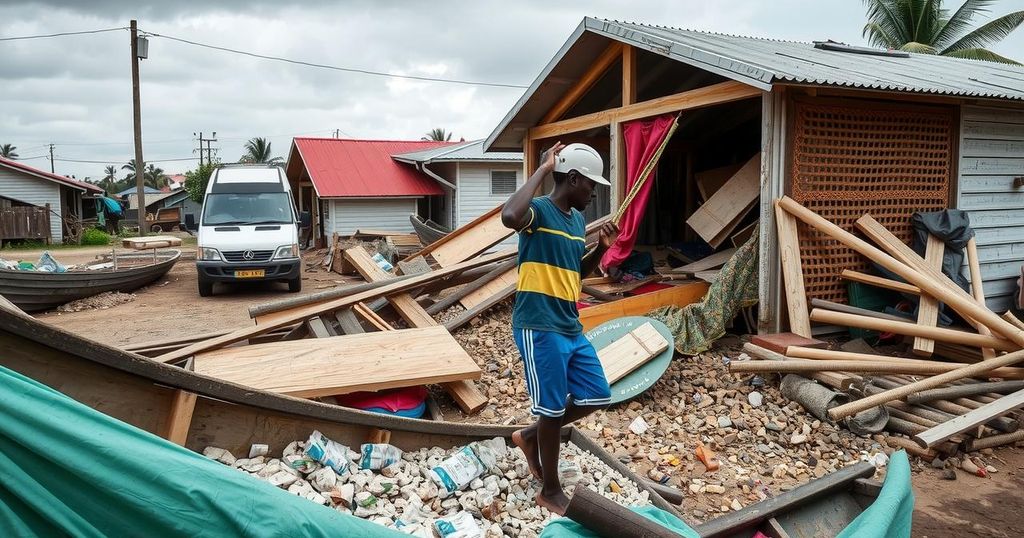World news
AFRICA, ATLANTIC OCEAN, CABO DELGADO, CHI, CHIURE, EMERGENCY RELIEF, EMERGENCY RESPONSE, INDIAN OCEAN, ISA, ISADORA ZONI, ISLAMIC STATE, MECUFI, MOZAMBIQUE, NATIONAL INSTITUTE FOR NATURAL DISASTERS, NATURAL DISASTER, NATURAL DISASTERS, UNITED NATIONS, UNITED NATIONS ’ REFUGEE AGENCY, UNITED NATIONS OFFICE FOR THE COORDINATION OF HUMANITARIAN AFFAIRS, ZONI
Lena Nguyen
0 Comments
Cyclone Chido Devastates Mozambique, Death Toll Rises to 75
Cyclone Chido’s death toll in Mozambique has surged to 75, devastating Cabo Delgado province already plagued by insurgency. The cyclone destroyed homes, health facilities, and schools, further worsening the plight of displaced populations. U.N. officials warn of a potentially severe rainy season ahead, raising concerns over continued humanitarian crises.
The death toll from Cyclone Chido in Mozambique has reached 75, nearly doubling the previously reported figure, as rescue teams reached remote areas affected by the storm. The cyclone struck the northern province of Cabo Delgado, exacerbating an already dire situation caused by ongoing insurgent conflicts. Initial reports indicated at least 69 fatalities and 740 injuries, with many people trapped due to destroyed infrastructure. Isadora Zoni from the United Nations remarked, “What you see is utter destruction,” following her visit to the ravaged district of Mecufi.
Mozambique, classified among the poorest nations globally, is highly susceptible to climate-related calamities. As Cyclone Chido battered the region, rural homes were devastated, and essential facilities, including health clinics and schools, faced severe damage. Hundreds of thousands had already been displaced by insurgent violence prior to the cyclone, with an estimated 10,000 individuals in Chiure district affected while living in temporary shelters. The situation for many has become more precarious as they contend with both conflict and climate-induced challenges.
As Cyclone Chido traversed the southern Indian Ocean, it exhibited wind speeds up to 115 mph, categorizing it as a significant hurricane. The cyclone also impacted Mayotte, with authorities there reporting at least 31 deaths. It has now dissipated over Zimbabwe, but the United Nations warns that this could signal the onset of a particularly destructive rainy season historically associated with severe weather events in the region. Past storms, including Cyclone Freddy and Cyclone Gombe, have already claimed many lives and displaced residents in Mozambique, where nearly 140,000 people have fled their homes due to extreme weather in recent years.
Cyclone Chido has struck Mozambique at a time when the country is grappling with significant challenges, including civil unrest and extreme weather conditions. The Cabo Delgado province, particularly vulnerable due to longstanding insurgent violence, is now also facing the severe consequences of climate change. Each year, Mozambique’s coastal regions experience cyclones derived from the southern Indian Ocean, which have a devastating impact on local communities, disrupting lives and infrastructure.
In summary, Cyclone Chido has resulted in a catastrophic increase in fatalities and injuries in Mozambique, compounding the struggles of a region already vulnerable due to insurgent conflicts and climate change. With areas such as Cabo Delgado suffering significant destruction, the international community must remain alert and responsive to these compounded crises that threaten both lives and livelihoods.
Original Source: www.nytimes.com




Post Comment